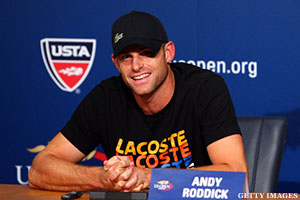
In September 2003, Andy Roddick was the toast of American tennis. The 21-year-old shocked the world at the U.S. Open to win his first Grand Slam title. More specifically, he stole the show from Andre Agassi, the 33-year-old who entered the tournament as the world's No. 1 player. Agassi suffered a semifinal defeat to Spain's Juan Carlos Ferrero. Roddick then disposed of Ferrero in three sets.
The torch was passed. Agassi, the last remaining player from the loaded American tennis generation that featured Pete Sampras, Jim Courier and Michael Chang, never regained the top ranking. Ferrero snatched it after that U.S. Open, but Roddick claimed it two months later. He became the first American not named Agassi or Sampras to hold the distinction since Courier in earlier 1993.
Roddick was the heir to the American throne, but then his road hit a few bumps. Then a few more. But the end is near. On Thursday, his 30th birthday, Roddick announced this year's U.S. Open will be his final opportunity at a second Grand Slam title as he will retire after the tournament. Did he underachieve or was he a victim of bad timing?
"I feel very bad for anybody that's come along in the era of arguably the three greatest tennis players of all-time," Agassi said Thursday in an interview with ThePostGame. "Certainly in my opinion, one of them is the greatest player of all-time. You could certainly make some comprehensive arguments across the board that history will judge this era as the Golden Age in tennis. That's quite a standard to live up to in quite an era of tennis."
Agassi has the unique perspective of witnessing Roddick's career as a mentor, fellow player and fan. Although Roddick may have been one of the most skilled players in the Open Era, his legacy will be judged against the success of his contemporaries Roger Federer, Rafael Nadal and Novak Djokovic.

And the excellence of those international stars might not be the only factor victimizing Roddick's reputation. Agassi played in arguably the Golden Age of U.S. tennis with his prime tailing off just before the Federer-Nadal-Djokovic generation. Agassi believes that created expectations for and judgments about Roddick because he was following that era of American tennis.
"Andy's had a lot on his shoulders a long time, trying to keep alive the Grand Slam titles that preceded," Agassi said. "They're the same pressures I felt coming off of the backs of McEnroe and Connors."
For a decade, Roddick served as the poster boy of American male tennis. He was emotional and controversial. He was loyal and devoted. He was marketable and respectful. He married a supermodel and adapted to social media. He did everything U.S. tennis needed from its alpha male, except win more Grand Slams. But it was not all his fault.
After earning the No. 1 ranking in late 2003, Roddick was overtaken in early 2004 by Federer, who held on to it for four and half years. Nadal and Djokovic are the only others to taste the top ranking since Roddick's 13-week reign.
Since Roddick's U.S. Open crown, Federer, Nadal and Djokovic have won 32 of a possible 35 Grand Slams. Roddick has made four Grand Slam finals in that time (all against Federer), but neither he nor any other American has won a Grand Slam.
"It's measured against a lot of Grand Slams at a time when there's just a lot of great players" Agassi said of Roddick's career.
As for U.S. tennis fans, Agassi advises they stay hopeful. The past decade has built character among U.S. fans who had not known defeat. Roddick's generation, which has included such Americans as James Blake, Mardy Fish, Robby Ginepri and Taylor Dent, gave U.S. fans a learning experience.

"I think we have some real optimistic players, unquestionably, who can pick up a very spoiled country when it comes to tennis and American champions," Agassi said.
Agassi believes with the big three in the tennis world and Roddick getting older, it is time to get giddy about some of the young American stars.
"I love the way Jack Sock is playing right now," Agassi said. "John Isner, how do you teach competing against 6-foot-10? I feel like me with my back and my hips right now, you could give me his size and weapons and I'm going to go make everybody miserable on the tennis court. [Ryan] Harrison is just learning his game. He has a lot of arm and certainly could leave his mark."
Youngsters Sam Querrey and Jesse Levine are also among possible future stars in the next generation of U.S. tennis.
Nine years have gone by since Roddick took the baton from Agassi's veteran hands. In that time, Roddick helped the U.S. stay relevant, but never climbed to the top of men's tennis the way many believed he would.
On a late summer afternoon in 2003 in New York City, a 21-year-old brought American tennis fans to their feet. Unless he makes a historic run as the 20th seed at this U.S. Open, he will never experience the same feeling.
Roddick's legacy will continue to be debated. Will he be remembered as a failed prodigy or a warrior in the toughest era in tennis history? Was he too emotional or not focused enough? Maybe he will be seen at the bridge from one successful American tennis generation to another.
Or maybe Agassi is right. Maybe Roddick was better than his win-loss total shows. Maybe he was just a victim of the most star-studded generation in tennis history.




